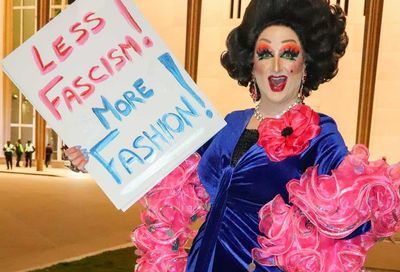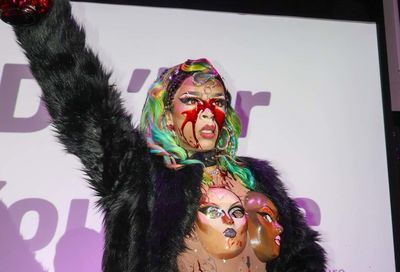DOMA Taking More Hits
Following up on its summer success attacking the Defense of Marriage Act, GLAD files a second challenge to the 1996 law – as the ACLU files a similar case in NYC
The Defense of Marriage Act faced a two-pronged attack on Nov. 9 as two separate organizations and sets of lawyers, representing different plaintiffs, filed lawsuits in federal court challenging the federal definition of marriage.
The Gay and Lesbian Advocates and Defenders (GLAD) filed a federal lawsuit in Connecticut challenging DOMA’s Section 3, which defines ”marriage” and ”spouse” in federal law as being limited only to opposite-sex couples. The plaintiffs include couples and a widower from three New England states with marriage equality: Connecticut, New Hampshire and Vermont.
Meanwhile, in New York City, the American Civil Liberties Union and the law firm of Paul, Weiss, Rifkind, Wharton & Garrison LLP filed a similar federal lawsuit on behalf of Edith Windsor, the widow of Thea Spyer. Windsor was forced to pay a $350,000 estate bill because of the federal government’s refusal to recognize Windsor’s marriage to Spyer.
Although the new GLAD lawsuit looks at first glance to be very similar to its Gill v. Office of Personnel Management lawsuit that resulted in a successful trial court ruling in July, the suit filed this week expands upon Gill by reaching out to include state and private corporation discriminatory treatment resulting from DOMA.
The actions are challenged not because of discretionary decisions made by the state or private entities – which include the New Hampshire Retirement System and Bayer Corporation – but instead because of the adherence of programs run by those entities to federal laws and regulations.
For example, the lawsuit claims that Joanne Marquis ”would receive a medical subsidy spousal benefit from the NHRS to help pay for her legal spouse [Janet Geller]’s private health insurance premiums, but for DOMA, which prohibits” the plan from providing her with the spousal benefit for Geller.
This expansion to cover the actions taken by state and private actors as a result of DOMA — though extremely significant — is just one of the two primary differences between this week’s filing and Gill.
The other, more obvious, distinction is that the Connecticut filing location of the case means that an appeal from this case would go to the U.S. Court of Appeals for the Second Circuit, which includes New York. Gill, coming from Massachusetts, is being appealed to the First Circuit. Those two circuits encompass all jurisdictions – except Iowa and the District of Columbia – that currently have marriage equality.
The New York City lawsuit, meanwhile, focuses on a couple who were the subject of a documentary, Edie & Thea: A Very Long Engagement, and whose 2007 wedding in Toronto was featured in The New York Times. New York recognizes same-sex marriages performed legally in other jurisdictions for limited purposes.
Roberta Kaplan, a partner at Paul Weiss who is the lead counsel in the case, spoke with Metro Weekly on Nov. 8 about Windsor’s lawsuit, summing the case up by saying, ”If Thea were Theo, she would have been able to pass her estate to Edie-tax free.”
Kaplan presents the facts succinctly.
”I have an 81-year-old client, and $350,000 is a hell of a lot of money – a huge amount of money that she paid in violation of the Constitution,” Kaplan said. ”My client had to pay the government, and she wants her money back.
”What we’re seeking in the case is a check back – with interest.”
Asked about the comparison between the ACLU case and the GLAD case in Connecticut, Kaplan said, ”I think the cases complement each other very well.”
Unlike the sole plaintiff in the ACLU case, the GLAD case features several plaintiffs, including lead plaintiffs Joanne Pedersen and Ann Meitzen of Connecticut.
GLAD details that Pedersen and Meitzen ”have been together for 12 years, and were married in 2008.” Pedersen is retired from the Department of Naval Intelligence, according to the release, and is unable to put Ann, who has serious and chronic lung conditions, on her health insurance plan.
Other plaintiffs in the case challenge the inability to receive leave under the Family and Medical Leave Act and Social Security death and other survivor benefits, as well as other differential treatment resulting from DOMA’s definition of marriage.
Regarding the legal theories of the cases, Kaplan said, of the ACLU case, ”It’s about a place [New York] where the marriage is recognized, so it’s similar to that theory [pursued by GLAD].” But, ”[b]ecause I think these cases come up in all sorts of different contexts,” she said the Windsor case was a ”dramatic” example of the discrimination couples face from DOMA.
”I think this case really gets people in the gut,” she said. ”Everyone can see themselves in the position Edie found herself in” – noting, however, that because Windsor was married to a woman and not a man she faced ”a $350,000 tax bill.”
Kaplan, who has worked with the ACLU seeking marriage equality in New York under state law, said, ”The best way, I think, to move ahead is to play on all the playing fields at the same time – including in state and federal court.”
Asked if the ACLU case figures into those efforts to gain marriage equality in the state, she said, ”In the bigger picture, I think this case is really part of that – but … it’s not a part of the state legislative battle.”
When asked about the questions that have been raised regarding the Department of Justice’s defense of DOMA and the ”Don’t Ask, Don’t Tell” law in court, Kaplan at first demurred.
Then, she said, ”What I do think is true is that in this case the Department of Justice is going to have a very hard time coming up with a reason to give a judge in the Southern District of New York why Edie and Thea should be treated differently than if they were Edie and Theo.”
Support Metro Weekly’s Journalism
These are challenging times for news organizations. And yet it’s crucial we stay active and provide vital resources and information to both our local readers and the world. So won’t you please take a moment and consider supporting Metro Weekly with a membership? For as little as $5 a month, you can help ensure Metro Weekly magazine and MetroWeekly.com remain free, viable resources as we provide the best, most diverse, culturally-resonant LGBTQ coverage in both the D.C. region and around the world. Memberships come with exclusive perks and discounts, your own personal digital delivery of each week’s magazine (and an archive), access to our Member's Lounge when it launches this fall, and exclusive members-only items like Metro Weekly Membership Mugs and Tote Bags! Check out all our membership levels here and please join us today!






















